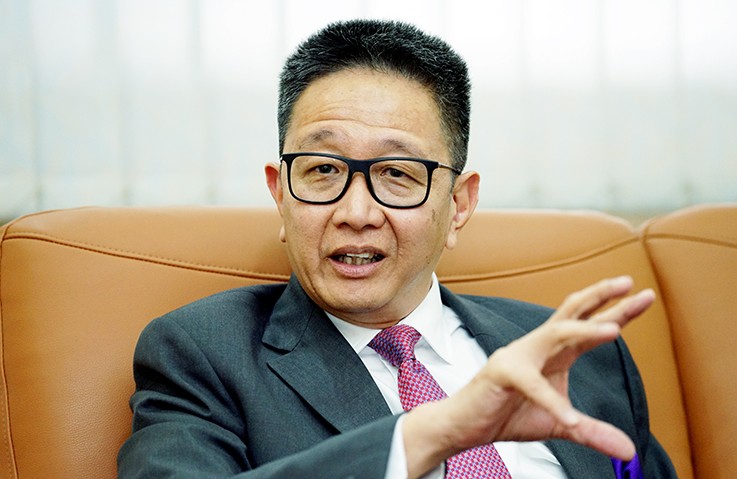
The world is showing no signs of recovering from the coronavirus any time soon.
After 10 months since its outbreak, more than one million people have died from the virus, while nearly 40 million people have been infected, leading to the closure of international borders to help curb the spread.
Any cross-border movement including ferrying of items and goods must also adhere to strict health guidelines.
In June, the United Nations (UN) announced that the global foreign direct investment (FDI) flows are expected to drop 40% this year, citing the pandemic as the principle factor.
The UN Conference on Trade and Development said the FDI will shrink from its 2019 value of US$1.54 trillion (RM6.23 trillion) to less than US$1 trillion for the first time since 2005.
Malaysia, which recorded RM82.38 billion of approved FDI last year, is expected to land only half of the figure before December.
The country’s most developed state, Selangor, would need to make adjustments in hosting its annual international summit — the Selangor International Business Summit (SIBS).
For the first time, SIBS will be held virtually with the state’s aim to engage businesses and stakeholders for the next 12 months via the Selangor Business Hub (SBH) initiative. SBH comprises Invest Selangor Bhd’s promotional programmes, Selangor Information Technology and E-Commerce Council meetings and SIBS which started on Wednesday.
Through SBH, Selangor targets to woo more than 3,000 small and medium enterprises (SMEs) on the online platform — a virtual place where they can market their products until SIBS 2021 takes place, said Selangor state executive councillor Datuk Teng Chang Khim (picture).
Teng said if the situation improves within the next year, Selangor will be prepared to welcome merchants, participants and exhibitors for physical events.
“This makes the initiative hybrid in nature, which we can adjust according to the new norm,” Teng told The Malaysian Reserve in an interview recently.
The Investment, Industry and Commerce, and SME committee chairman said it is still tricky for the host, Invest Selangor, to gauge the final number of participants for SIBS this year.
“It is challenging but yet exciting because we had never held such an event before. Previously, we only did physical events but now we can do both — physical and virtual.
“We are still unable to estimate how many participants would take part. Without physical interaction, it will be an interesting event which also gives us opportunities to explore more,” Teng added.
Last year’s SIBS exhibition raked in RM447 million in business transaction value, surpassing the targeted business transaction value of RM250 million, which also included RM200 million garnered from the Malaysia-China Entrepreneur Conference.
SIBS 2019 attracted over 34,000 visitors, exceeding the initial expectation of 30,000 visitors.
Teng had earlier aimed at least 35,000 walk-in visitors this year.
“We had also projected better sales this year, unfortunately due to this pandemic, we have to postpone the event to next year.
“Meanwhile, we are still engaging participants through the virtual SIBS and this will give us better preparation towards any possibility next year,” he added.
Happening until tomorrow, the four-day virtual summit comprises an exhibition, conference and webinar series featuring Selangor International Expo (SIE), Selangor Asean Business Conference (SABC) and Selangor Smart City and Digital Economy Convention (SDEC).
Teng said SIE focuses on the food and beverage (F&B) industry and aims to attract manufacturers, traders, policymakers and trade buyers to visit the event. So far, more than 300 companies have already signed up to participate in SIE.
Meanwhile, the SABC conference provides another networking event for regional think tanks, government officials and business communities to engage and discuss ways to move forward as a region.
SDEC focuses on creating networking opportunities for start-ups and tech companies in the region.
Besides focusing on F&B, which is one of the main contributors to SIBS for the last five years, Teng said Invest Selangor also does not want to miss out on promoting the growing healthcare sector.
“Healthcare will be one of our next focuses, not only in terms of medication, pharmaceutical and supplements but also Health Tourism.
“Invest Selangor and Tourism Selangor are working on it, and we need a comprehensive plan to develop this because Selangor has the infrastructure in place.
“It has the biggest number of private and public hospitals compared to other states, and a big pool of staff in the medical and healthcare sectors, so we must utilise these,” Teng said.
Moving forward, the Klang assemblyman said SIBS will continuously look into ways and innovative mechanisms to ensure the programme benefits all six million residents in Selangor.
“When we started with Selangor International Expo in 2015, we discovered the state had already been a gateway in Asean.
“Since then, we have aimed to become a global trading hub and are looking at a larger map — which is a global map instead of only Malaysia and Asean.
“Then we looked into the business-to-business platform, but since the trend now is online-to -online platform, we adjust accordingly. This helps with the state’s vision,” Teng said, acknowledging that the state would need to do more adjustments according to the current pandemic situation.
This, he said is pertinent so SIBS remaining relevant not only for the government, but more importantly for its people.
“Although SIBS does not involve micro SMEs directly now, positioning Selangor as the global trading hub will definitely benefit local supply chains in the long term as more products can reach the market at a greater scale,” Teng explained.
“Despite the disruption, it is also a blessing in disguise for Selangor to explore more and do better,” Teng said.
Source: https://themalaysianreserve.com/2020/10/16/sgor-faces-covid-19-challenges-with-hybrid-summit/

